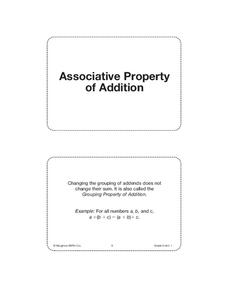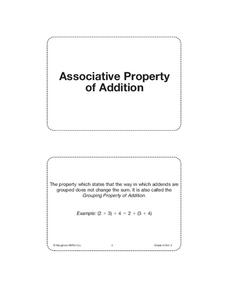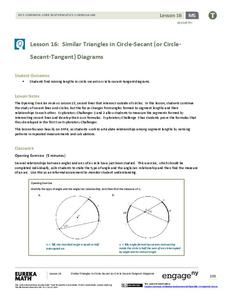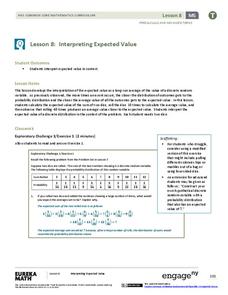Curated OER
Estimating Sums and Differences
In this math worksheet, learners learn to estimate sums and differences by completing step by step exercises. There is one word problem which is the example, and then students can choose from other estimation activities to do with a...
Curated OER
Make 10 to Add: Practice
In this adding to 10 learning exercise, students learn how to solve addition problems with sums greater than 10 by first making ten and adding in the remaining numbers. In the second set, students find the missing number to add to ten to...
Houghton Mifflin Harcourt
Unit 1 Math Vocabulary Cards (Grade 5)
Associative property of addition, exponents, and variables are a few of the terms that a set of flash cards includes and are designed to support math vocabulary instruction. Cards offer a a bold-faced font as well as a thorough...
Houghton Mifflin Harcourt
Unit 2 Math Vocabulary Cards (Grade 3)
A set of third grade math vocabulary cards include topics that range from addition properties to terms like estimate and fact family. Each sheet has two cards on it. The top half is the word printed in bold text, while the bottom is the...
EngageNY
An Application of Linear Equations
Just how far will the Facebook post go? Lead a discussion on how to manipulate the sum of a geometric series to figure out a formula to find the sum at any step. The plan contains an alternative to the discussion with more accessible...
Willow Tree
Surface Area of Three-Dimensional Figures
Lateral area and surface area are simple concepts, but calculating them is not as easy! Using formulas, learners calculate lateral area and surface area for the same three-dimensional figures. The resource discusses the formula variables...
Public Schools of North Carolina
Math Stars: A Problem-Solving Newsletter Grade 4
Fresh off the press, these math newsletters will challenge the problem solving skills of your young mathematicians. With an incredibly wide variety of questions covering the topics of arithmetic and geometry, these unique...
EngageNY
Applications of Systems of Equations and Inequalities
Is the application of systems of equations giving your class headaches? Use this resource to build on your pupils' logic to lead them to building equations and using algebraic methods. The lesson begins with an exploration of solving...
Virginia Department of Education
Constructions
Pupils learn the steps for basic constructions using a straightedge, a compass, and a pencil. Pairs develop the skills to copy a segment and an angle, bisect a segment and an angle, and construct parallel and perpendicular lines.
EngageNY
Divisibility Tests for 3 and 9
Who knew the sum of a number's digits gives such interesting information? The 18th installment of a 21-part module has scholars investigate division by three and nine. After looking at several examples, they develop divisibility tests...
Novelinks
Zach’s Lie: Magic Squares
Individuals match vocabulary words within a magic square, a concept that ties in nicely with math class. The words are all located in Zach's Lie and were specifically selected to increase comprehension of the text. Fifth in a series of...
Houghton Mifflin Harcourt
Unit 4 Math Vocabulary Cards (Grade 3)
Bring a set of 19 math vocabulary cards to your third grade math class. Each sheet contains two cards. The top half has the vocabulary word printed in bold text, while the bottom half has the definition of the word. Card topics include...
Mathwire
Shamrock Paths
What could St. Patrick's Day and Pascal's triangle possibly have in common? Trace the pattern in a holiday-themed learning exercise that prompts learners to find the word shamrock as many times as they can.
EngageNY
Similar Triangles in Circle-Secant (or Circle-Secant-Tangent) Diagrams
First angle measures, now segment lengths. High schoolers first measure segments formed by secants that intersect interior to a circle, secants that intersect exterior to a circle, and a secant and a tangent that intersect exterior to a...
Houghton Mifflin Harcourt
Unit 4 Math Vocabulary Cards (Grade 4)
Looking for a set of math vocabulary cards for fourth graders? A 14-page packet of vocabulary words includes topics related to multiplication, division, and factor types. Each sheet has two cards on it: the top half has the word in bold...
Curated OER
Find Sums Using Math Counters 2
In this addition practice learning exercise, learners use math counters to solve 8 problems that require them add 1-digit numbers to 1-digit numbers.
Curated OER
Find Sums Using Math Counters
In this addition practice worksheet, students use math counters to solve 8 problems that require them add 1-digit numbers to 1-digit numbers.
Curated OER
Using 10 to Add 7, 8, and 9
In this adding worksheet, students learn to make a ten when adding the numbers 7, 8,or 9. After looking at the examples, students solve 10 problems with addition facts.
Curated OER
Countdown Challenge: Tricks for Finding Multiples of 3 and 4
In this tricks for finding multiples worksheet, students explore rules of divisibility. They compute the sum of the digits to determine if a number is divisible by three. Additionally, students identify the last two digits of a number to...
Curated OER
Find the Missing Number
Kids can use the train themed number line to help them solve any of the 12 missing addend math problems. They must determine what plus the given number equals the provided answer.
Curated OER
Find My Family
For this fact family worksheet, students draw lines to match math facts in the left and right columns to the answers which are written on pictures of puppies shown in the center. They find both sums and differences.
Curated OER
Crabby Math
Here are 4 different (yet related) worksheets and an answer key for each. The class will work through each sheet, adding single-digit number to find sums. They then color in the sums that meet each worksheets instructions. For example:...
EngageNY
Interpreting Expected Value
Investigate expected value as a long-run average. The eighth installment of a 21-part module has scholars rolling pairs of dice to determine the average sum. They find aggregate data by working in groups and interpret expected value as...
Curated OER
Addition Drills, part 2
Add them up! Scholars add up double-digit addends to find sums for 32 equations. There are three examples learners can reference if needed, and they have to regroup for many of these. The equations aren't numbered, so consider doing this...

























